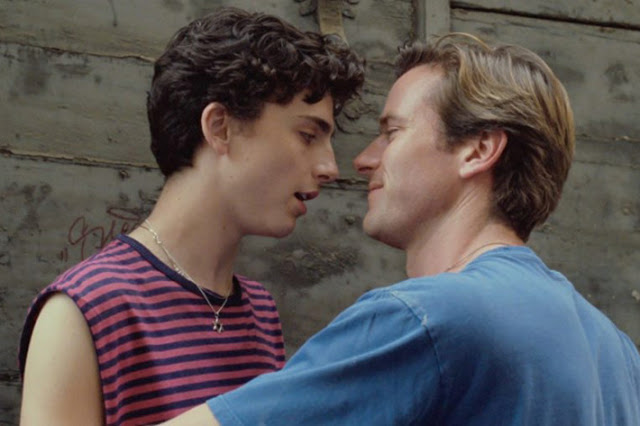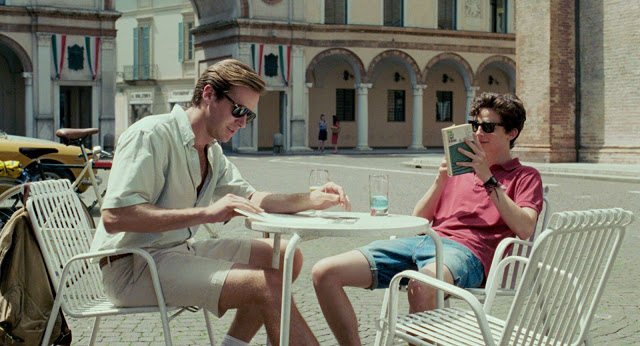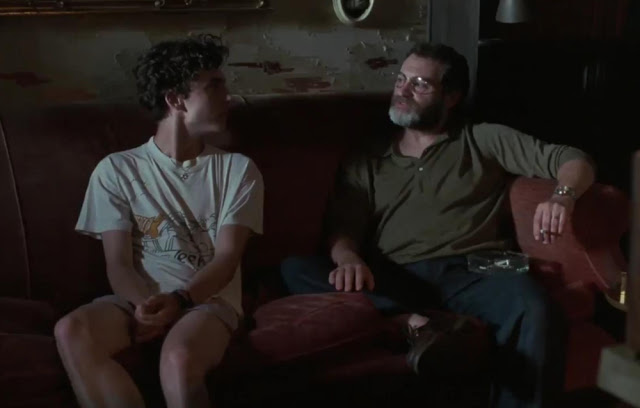“So what do you do around here?” Oliver asks Elio early in Call Me by Your Name, Luca Guadagnino’s feverish, unusual love story. In response, the 17-year-old ticks off a number of banal activities—he reads, he swims, he parties—but his answer basically amounts to, “Not much.” Over the course of its 132-minute running time, Call Me by Your Name stirs up a broad array of emotions—desire, heartache, anger, elation, grief—but what it perhaps evokes most effectively is that ineffable state of boyhood restlessness, the feeling of being suspended in a cocoon where nothing of consequence ever happens. Elio is something of an intellectual and musical prodigy (“Is there anything you don’t know?” an amused Oliver asks), but as the movie opens, he is nevertheless waiting for his life to begin.
By the time the film ends, he’ll have undergone a transformative experience that will feel largely familiar to enthusiasts of coming-of-age cinema. Yet while Call Me by Your Name travels well-covered narrative terrain, it is not exactly typical. It is, in essence, a strange telling of a normal story. In chronicling the standard tale of a young man discovering himself, Guadagnino has retained the basic elements but altered them, glazing them with a peculiar finish that mixes awkwardness with compassion. To watch the film is to feel by turns frustrated, surprised, confused, and blissful—you know, kind of like falling in love.
A picturesque study of two bodies cautiously orbiting one another before ultimately colliding with seismic force, Call Me by Your Name is structured as a gradual courtship—emphasis on “gradual”. Set in a sleepy, bucolic town in Northern Italy in 1983 (the screenplay is by James Ivory, based on André Aciman’s novel), it unfolds primarily at Elio’s home, a ramshackle house surrounded by a vast peach orchard and dotted with tranquil pools and ponds. Elio’s father (Michael Stuhlbarg), an esteemed professor of some scholarly discipline or other, has invited Oliver (Armie Hammer) to stay for the summer to help with his work, which appears to mostly involve looking at projector slides of handsome statues and occasionally digging something up at the beach. Initially, Elio (Timothée Chalamet) regards this strapping interloper with mild annoyance, given that he displaces Elio from his bedroom, favors faux-friendly American slang (“later,” “thanks man”), and effortlessly attracts all the attention of the local girls.
Things change, albeit slowly. Guadagnino is maybe too successful in tapping into the languid humidity that suffocates Elio’s teenage doldrums, a subsistence of go-nowhere bike rides, aimless swims, and impassive lounging. Certainly, as he showed in his prior films (the excellent I Am Love, the wobbly A Bigger Splash), the director has a talent for conjuring natural worlds of rich, sensual atmosphere; when Elio bites into a peach, you can taste the juice dripping off his tongue. All the same, the opening passages of Call Me by Your Name feel sluggish, Guadagnino prioritizing ambiance over character.
As Elio and Oliver draw closer to one another, the movie’s energy picks up, even if its narrative remains proudly, flagrantly untethered to traditional cinematic rhythms. Most love stories traverse the same basic arc, journeying from attraction to consummation to complication. Call Me by Your Name doesn’t entirely discard that pattern, but it nevertheless feels gratifyingly freewheeling and unpredictable. Relationships, Guadagnino seems to suggest, are not bifurcated into discrete periods of togetherness and separation but are instead messy, fleshy organisms that ebb and flow. Being in love is more complicated than being happy, and more interesting too.
To properly convey such a complex emotional thesis, Guadagnino requires nuanced and graceful work from his actors; thankfully, the one unvarnished triumph of Call Me by Your Name is its twin lead performances. The physical contrast helps intensify the pairing’s oddness; with his careless curls and narrow shoulders, Chalamet is the picture of winsome smallness, while the gigantic, barrel-chested Hammer looks like one of the professor’s sculptures brought to life. Of course, love is about more than mere physical connection, and the stars here collaborate to create a delicate bond that matches the film’s quicksilver tenderness. In the nominal lead role, Chalamet has earned the lion’s share of the praise, and he fearlessly conceives Elio as painfully uncertain, equal parts youthful recklessness and sweet naïveté. But Hammer is equally good, playing up Oliver’s natural charisma while also revealing him to be a man of uncommon intelligence and sensitivity.
The two actors work so well together, you may find yourself wishing they shared the screen more often, and that Guadagnino had ditched his elliptical style and instead loaded the film with more plot. But where his prior movies relied on melodrama to express big emotions, here he’s more restrained, almost stubbornly disdainful of catharsis. It’s a bit vexing, though maybe he’s just playing us against our expectations. When Elio’s main squeeze, Marzia (Esther Garrel), tells him, “I’m scared you’ll hurt me,” she’s articulating a prescient fear stemming from a primal ache (though it leaves the starstruck Elio merely perplexed), but she’s also speaking on behalf of the audience. Watching a precocious teenager become enraptured with an older, more worldly figure, it’s instinctive for us to feel guarded, to shield ourselves against the inevitable misery and heartbreak to come. Yet Guadagnino’s filmmaking proves too empathetic to be hurtful; even if his attention is easily diverted, his compassion is limitless.
Besides, even if Call Me by Your Name’s broader narrative shambles along, its individual scenes offer bountiful pleasures, basking in the production’s redolent naturalism. The most affecting sequences tend to be long, interrupted takes, as when Elio plays the same piece on piano in three different styles for an impressed Oliver, or when the two circle a fountain in the town piazza, speaking in coded language. And a gripping scene of foreplay by a lake is essentially the movie in miniature: sun-dappled, heavily charged, yet refusing to provide clear resolution.
If the majority of Call Me by Your Name can be frustrating as well as intoxicating, it drops the act in its final scenes, at last delivering moments of raw, straightforward power. A speech from Elio’s father is devastating in its paternal warmth, even if it sidesteps the lingering question of age difference. And the film’s last shot—set to an exquisite Sufjan Stevens song, one of three originals the musician composed for the movie—is a stunner, condensing a lifetime’s worth of love and loss into the ripples of emotion cascading across Chalamet’s face. Call Me by Your Name can be challenging, and the reactions it provokes aren’t always satisfying. But it’s better to have felt and failed than never to have felt at all.
Jeremy Beck is the editor-in-chief of MovieManifesto. He watches more movies and television than he probably should.




